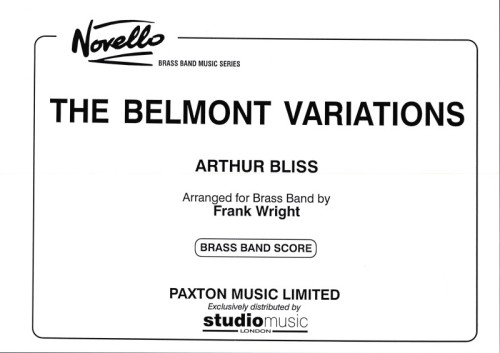Results
-
 £32.95
£32.95Belmont Variations (Brass Band - Score only) - Bliss, John - Wright, Frank
2nd Section Test PieceRecorded on Polyphonic QPRL041D Variations
Estimated dispatch 7-14 working days
-
 £75.00
£75.00DA VINCI (Brass Band) - Neurohr, Ludovic
French Open 2016 Championship Section Test Piece
Estimated dispatch 7-14 working days
-
 £71.50
£71.50DARKNESS VISIBLE (Brass Band Set) - Grantham, Richard
Score and Parts. 2011 National Championships Finals Test Piece - 3rdSection.
Estimated dispatch 7-14 working days
-
 £44.95
£44.95DIVERTIMENTO (Kelly) (Brass Band - Score only)
4th Section Test Piece
Estimated dispatch 7-14 working days
-
 £69.95
£69.95ENGLISH FOLK-SONG SUITE (Vaughan-Williams) (Brass Band - Score and Parts) - Vaughan Williams, Ralph - Wright, Frank
This masterwork by Ralph Vaughan Williams has stood the test of time and continues to receive numerous performances on a yearly basis.A must for any library!
Estimated dispatch 7-14 working days
-
 £32.95
£32.95ENGLISH FOLK-SONG SUITE (Vaughan-Williams) (Brass Band - Score only) - Vaughan Williams, Ralph - Wright, Frank
Score onlyThis masterwork by Ralph Vaughan Williams has stood the test of time and continues to receive numerous performances on a yearly basis.A must for any library!
Estimated dispatch 7-14 working days
-
 £34.95
£34.95FUN AND GAMES (Brass Band) - Wood, Gareth
This overture is festive in mood, rich in melody and powerfully rhythmic. Written for the Pencampwriaeth Pres BBC Radio Cymru competition, it has all the technical challenges of a test piece, but is just good fun!
Estimated dispatch 7-14 working days
-
 £69.95
£69.95HENRY V (Overture) (Brass Band - Score and Parts) - Vaughan Williams, Ralph
Henry the Fifth. Butlins 2018 3rd Section Set Work. 2011 National Championships Finals Test Piece - 4th Section.
Estimated dispatch 7-14 working days
-
 £32.95
£32.95HENRY V (Overture) (Brass Band - Score only) - Vaughan Williams, Ralph
Henry the Fifth. Butline 2018 3rd Section Set Work. 2011 National Championships Finals Test Piece - 4th Section.
Estimated dispatch 7-14 working days
-
 £25.00
£25.00LION AND THE ROSE, The (Brass Band Extra Score) - Wilby, Philip
Score only. 2017 Butlins Mineworkers Contest Test Piece Third Section.
Estimated dispatch 7-14 working days
